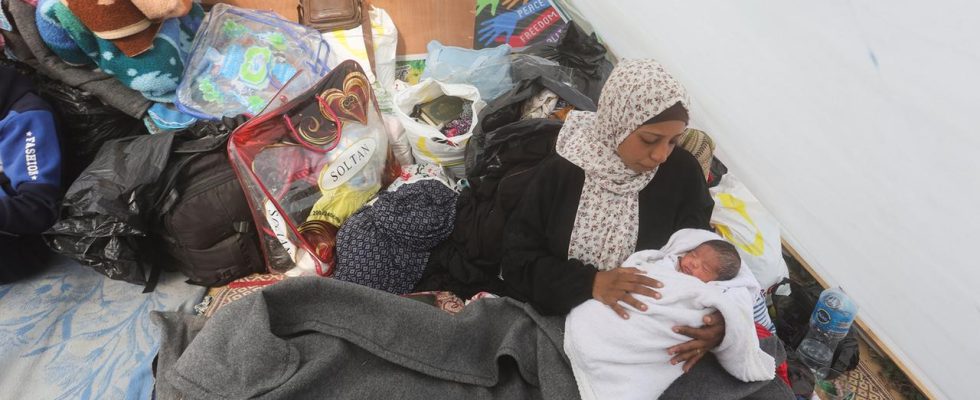Hundreds of thousands of people in Gaza are starving. But when mothers don’t get enough food, their babies also suffer – the milk doesn’t fill them up. And in war, even giving birth is life-threatening.
When people in Israel talk about the suffering of women in the Gaza Strip, most people probably think of the 15 female hostages still being held there. Hardly anything is known about how they are doing, not even whether they are still alive.
If you ask Palestinians, they will talk about the suffering of hundreds of thousands of women in the Gaza war. Women particularly suffer from the catastrophic supply situation there – especially if they are pregnant or have small children. A few weeks ago, Sima Sami Bahous, director of the UN Women’s Organization, drew attention to this.
According to her, 180 women in the Gaza Strip give birth every day – without water, without painkillers, without anesthesia for a cesarean section, without electricity for incubators and without other medical supplies. “And yet they continue to look after their children, the sick, the elderly, they prepare baby milk with contaminated water, they don’t eat anything themselves so that their children can survive another day. With great risks in completely overcrowded camps. They are deprived of their lives , their safety and their dignity.”
Difficult situation in Rafah
At Em Ismael, the child she recently gave birth to screams. She actually comes from the completely destroyed Gaza City, but now she lives in a tent in Rafah with five children. Well over a million people are seeking protection in the city in the hope that the fighting here will be less intense – and that aid supplies will come across the border with Egypt.
But for women like Em Ismael it’s not enough: “As a woman who has just given birth, I need something to eat. At the moment I am not getting any help, we are surrounded from all sides. This has an impact on my health, my abilities “If there is no healthy milk, it has a negative impact on the child’s development.”
Without enough food, there is no satiating breast milk
A few tents away, Em al-Amir is in a similar situation. The 29-year-old also actually has to breastfeed her baby. The most normal thing in the world in peacetime. But now it doesn’t work, she says: “Even if the baby is breastfed, it stays hungry and cries all the time. Because if a mother eats well, then it goes into the milk and the baby gets full. But if it doesn’t eat well “If there is food, how should you breastfeed the baby? Then it needs milk substitute.”
According to the United Nations, more than 500,000 people in the Gaza Strip are facing starvation, including many women. It is estimated that 50,000 women there are pregnant. Around 40 percent of these are considered high-risk pregnancies. There are reports that the number of miscarriages has increased by up to 20 percent. Births often take place without a doctor or midwife. Often there are not even sterile tools to cut the umbilical cord, doctors and nurses report.
Hardly normal hygiene possible
And women who are not pregnant also have a problem when they have their period. There are not enough hygiene products – let alone a bathroom, reports al-Amir: “A large number of people use the bathroom. Here, at least seven people live in each tent. More than 200 have to share a bathroom. I have to wait for an hour and a half, when I have to go to the bathroom. And imagine what it looks like. Completely dirty. The situation is very difficult.”
Women, along with minors, are the most affected in the Gaza war. According to the UN, they account for around 70 percent of the dead and injured. And they are particularly affected by the fact that far too few aid supplies arrive in the area.
Jan-Christoph Kitzler, ARD Tel Aviv, tagesschau, March 8, 2024 10:24 a.m

